#palestinian academy for science & technology
Link
In a tweet shared on Twitter, the Palestinian Campaign for the Academic and Cultural Boycott of Israel (PACBI) claimed that they are displaying a photo where the so-called "Tantura Massacre" took place in 1948, but a Holocaust expert proved it was actually a Nazi concentration camp in Germany. The photo showed tens or possibly hundreds of corpses in a black and white photo, before being buried in a mass grave.
The Palestinian Academy for Science & Technology calls on @EMBOto relocate workshops from apartheid Israel, including the one at the site of the Tantura massacre."EMBO has a moral obligation to end its complicity in whitewashing Israel’s crimes." https://t.co/UVfNJgCqEa pic.twitter.com/pOo1x49emD
20 notes
·
View notes
Text
Oh ffs. Using a 1945 photo of dead concentration camp victims as "proof" of a fictional massacre in 1948 Israel is cynical and wrong on so many levels.
Excerpt:
Diaspora Affairs and Combating Antisemitism Minister Amichai Chikli responded on Twitter to the matter, saying “the racist BDS movement breaks a Guinness record, uses a picture from the German concentration camp of Nordhausen to lie about a fictional massacre during Israel’s War of Independence. Holocaust distortion, appropriation and denial, further victimizing Jewish people. Pure evil.”
24 notes
·
View notes
Text
BBC 0430 27 Feb 2023
9915Khz 0358 27 FEB 2023 - BBC (UNITED KINGDOM) in ENGLISH from TALATA VOLONONDRY. SINPO = 55433. English, dead carrier s/on @0358z then ID@0359z pips and newsroom preview. QSB=rapid rate fading, effecting modulation. @0401z World News anchored by Neil Nunes. At least one Palestinian was killed when hundreds of Israeli settlers descended on the northern occupied West Bank town of Huwara on Sunday, attacking Palestinians and setting dozens of cars and homes ablaze, according to Palestinian officials. The rampage came after Israeli authorities said a Palestinian gunman killed two settlers in the town earlier in the day. The shooting of the settlers took place just days after a massive Israeli military raid into Nablus in search of wanted militants left at least 11 Palestinians dead. Huge rallies have been held in several Mexican cities against what protesters say are government attempts to undermine the electoral authorities. The biggest was in Mexico City, where organisers say 500,000 people marched on the city's main plaza. The local government put the number at 90,000. Lawmakers last week voted to slash the budget of the National Electoral Institute and cut its staffing. A Russian A-50 surveillance military aircraft was damaged in a drone attack at an airfield near the Belarus capital of Minsk on Sunday, Belarus partisans and members of the exiled opposition said. Billionaire technology dealmaker Bao Fan is cooperating with Chinese authorities conducting an investigation, his bank says. China Renaissance Holdings, of which he is CEO, reported that he had gone missing 10 days ago. Mr Bao's disappearance comes against the backdrop of a crackdown on leading technology companies by Chinese authorities. Russia's war in Ukraine looms large as the UN Human Rights Council meets Monday, with calls for unity in condemning Moscow and extending a probe into war crimes in the conflict. Days after the United Nations General Assembly in New York voted overwhelmingly to demand Russia immediately withdraw from Ukraine, Moscow's war is expected to dominate the opening of the top UN rights body's main annual session in Geneva. Australian firm Recharge Industries has bought the defunct battery maker Britishvolt out of administration. Walter Mirisch, the astute and Oscar winning film producer who oversaw such classics as “Some Like It Hot,” “West Side Story” and “In the Heat of the Night,” has died of natural causes, the Academy of Motion Picture Arts and Sciences said Saturday. He was 101. @0406z "The Newsroom" begins. Backyard fence antenna, Etón e1XM. 250kW, beamAz 315°, bearing 63°. Received at Plymouth, United States, 15359KM from transmitter at Talata Volonondry. Local time: 2158.
0 notes
Link
BDS can’t even let the Jewish dead of the Holocaust keep their identity. Everything Jewish, from our history to our heritage and sacred sites to the bodies of those slain for being Jews. Shame on BDS for its attempted deception.
0 notes
Text
Harvard Lends a Hand in the Effort to 'Islamicize' Science
Harvard once again showing it is down with the jihad. Money might not buy love, but it sure buys a lot of submission to Islamic sharia at Harvard and other big U.S. universities.
Our last check-in with saw Harvard University hire a PLO negotiator who helped establish a fund to pay families of Palestinian jihadists, prior to that Harvard was paying to advance sharia and sway U.S. policy, and prior to that Harvard ‘Islamic law’ librarian was arrested for attempted child sexual assault. Who knows what we missed in between.
The latest below.

Harvard Lends a Hand in the Effort to 'Islamicize' Science
By Majid Mohammadi
A few days ago, an email from Zahra Takhshid (granddaughter of Mohammad Yazdi, former head of the Islamic Republic's judiciary) was sent to some people, and I was one of the recipients. In this e-mail, a plan for the Islamization of information technologies in the field of law, especially sharia, was proposed. This is apparently the research project of Takhshid as one of the lecturers at Harvard Law School. Harvard University, which once trained members of the U.S. Supreme Court, is at one of its lowest points today, where the Islamicization of the internet and information technology has been promoted by the granddaughter of one of the founders of the Islamic Republic of Iran.
Harvard University has an Islamic law program at its law school that spends millions of dollars a year rereading and trying to modernize sharia. It is within this framework that people like Zahra Takhshid are hired — not to reinvent the wheel (it could be useful and teach them something), but to invent something that is supposed to work like the wheel but is not a wheel. The ideologues want to reinvent sharia as a system of law to legitimize their totalitarian power and wealth. Basically, the plan to Islamize science has been a political plan from the beginning to gain power by eliminating the empiricist and rationalist approaches to science.
During its work, Harvard Law School's Islamic Law Program has not provided a single report on the inconsistency of sharia or its interpretations with human rights; the brutality enshrined in Islamic sharia rulings in the judicial realm; and the record of the Taliban, ISIS, and the Islamic Republic of Iran in judicial affairs, as if these phenomena do not exist. Despite the New Left (Adorno, Foucault, and Gramsci) claiming a critical approach to society and politics, this approach has been completely ignored in the humanities and social sciences, as any criticism would ultimately offend a group and disrupt the political coalition of the left. The thin-skinned ruling Islamists in Iran would also be hurt. The record of such centers, which work on the basis of identity politics, shows what a failure this ideology has delivered in the field of research and education.
The idea of a quantum internet project focuses solely on injecting Islamic teachings into it. The advertisement for student recruitment for this delusional project speaks of "Islamic digital humanities/data science space" that exists only in a fantasy world unless we study the filtering, censorship, and hacking of Islamists in this category. The author, like the students of Shi'i seminaries, calls "use of a data science/digital humanities tool, method, or a data set to answer novel questions in the fields of Islamic law or history" (in fact, using digital tools to search for Islamic legal texts, jurists' fatwas, and religious books) and cataloguing them as "Islamic digital humanities." This naming happened after buying thousands of computers for seminaries in Iran.
Another discussion of this educational project is "principles of Artificial Intelligence in Islam," which should probably be found in the works of Shi'ite imams (1100 to 1300 years ago) by digging in religious texts. Since the 1950s, Islamists have sought to find all the achievements of modern civilization in Islam. This effort has not only not pushed religion and knowledge forward, but has sparked a wave of religious totalitarianism around the world. Islamists have extracted all the principles of the world of technology, art, literature, and science from Islam in the last sixty years and have increased their power and wealth. When you believe that in one book, all the knowledge of the world is hidden, you start digging and digging to extract everything from it, and the Harvard donors and the oil revenues of the Iranian people will provide for it.
The author of the plan for this class claims she wants to extract the moral and legal principles of artificial intelligence from Islam, as Munir al-Din Hosseini did at the Academy of Islamic Sciences and Mesbah Yazdi at Baqir al-Uloom Institute in Iran (they both failed). The Islamists' preconceived notion is that Islam is a moral school (assuming that religion and morality are the same) and human intellect and experience are unable to regulate these areas. If this is taken seriously, eventually, Takhshid and her comrades will set up an Ifta Council and later a Guardian Council in Harvard to extract all principles and policies from the Quran and hadith, because the non-jurist has no authority to work in these areas and cannot attach the terms of Islam to his interpretations.
In the last six decades, Islamists have not proposed any educational or research program without Islamization at the core. They think this is an alternative plan, the importance and fruitfulness of which Western societies and educational environments have not realized. The research project that has been a waste of resources in universities in Iran has been brought to Western universities today and has found a place to be presented under the ideology of identity politics. Today's generation in these universities is oblivious to the fact that this plan was copied from the Marxist (ideological) plan of science, which itself has caused scandals for a hundred years.
Islamists have been successful in packaging and promoting their snake oil. Munir al-Din Hosseini, who wanted to create Islamic electronics and chemistry in addition to Islamic sociology and psychology, named his institute "the Academy." This name does not fit much in the Islamists' anti-Westernism and avoidance of Western concepts, but it gives legitimacy to his institution in the eyes of the Muslim masses. Mesbah called the activity of Islamization of sciences under his supervision "cooperation between the seminary and the university," which no one has a problem with, but the type of activity had no legitimacy. Zahra Takhshid at Harvard also calls her activity the "Islamic Law Lab." In fact, there is no laboratory, but the classroom is called a laboratory to gain more attention and give it experimental value.
Before the domination of the ideology and discourse of identity politics in the academic space (modernist discourse), Muslims, like other religious scholars, followed the scientific method and had positive achievements, such as Abd ul-Salam (a Pakistani scientist) in the field of physics. Identity-oriented science has seriously damaged both Western universities and Muslim participation in the world's educational and research institutions.
For forty-two years, the Iranian people have been paying the price for Islamicizing everything from politics, art, science, and academia to architecture, family, city squares, and even mountains and deserts by daily suppressing their rights and wasting their financial and institutional resources. Harvard executives still do not have a grasp of it. They have not been commanded that science cannot be ideologized or mixed with religion or identity.
The whole Islamization project has been a big business for devouring Muslims' wealth and prestige in the Middle East. Unfortunately, today, Harvard financiers and executives have fallen to a level of followers and imitators of the Shi'ite clergy in Iran who sell Islam for their own interests.
9 notes
·
View notes
Photo
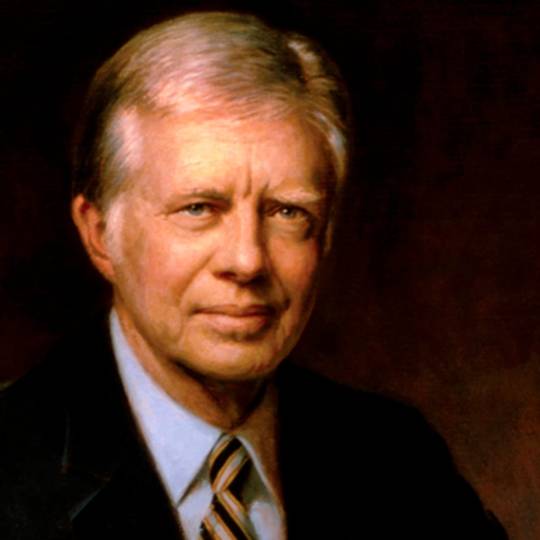
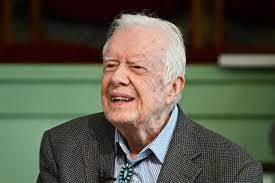

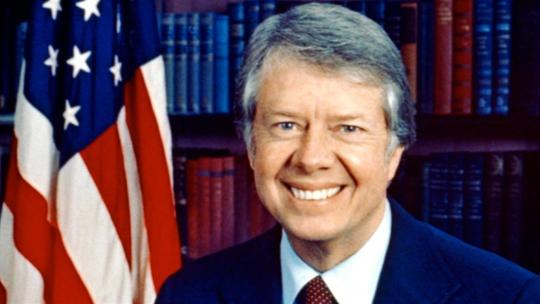
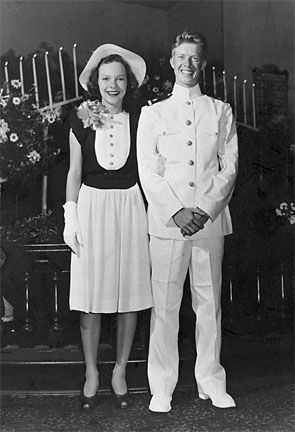

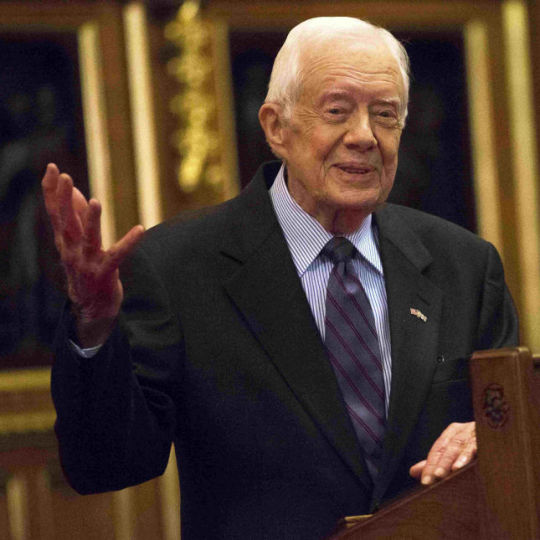


Arrivals & Departures
01 October 1924
James Earl Carter Jr.
James Earl Carter Jr. is an American politician, philanthropist, and former farmer who served as the 39th president of the United States from 1977 to 1981. A member of the Democratic Party, he previously served as a Georgia State Senator from 1963 to 1967 and as the 76th governor of Georgia from 1971 to 1975. Since leaving the presidency, Carter has remained engaged in political and social projects as a private citizen. In 2002, he was awarded the Nobel Peace Prize for his work in co-founding the Carter Center.
Raised in Plains, Georgia, Carter graduated from the United States Naval Academy in 1946 with a Bachelor of Science degree and joined the United States Navy, where he served on submarines. After the death of his father in 1953, Carter left his naval career and returned home to Georgia to take up the reins of his family's peanut-growing business. Carter inherited comparatively little due to his father's forgiveness of debts and the division of the estate among the children. Nevertheless, his ambition to expand and grow the Carters' peanut business was fulfilled. During this period, Carter was motivated to oppose the political climate of racial segregation and support the growing civil rights movement. He became an activist within the Democratic Party. From 1963 to 1967, Carter served in the Georgia State Senate, and in 1970, he was elected as Governor of Georgia, defeating former Governor Carl Sanders in the Democratic primary on an anti-segregation platform advocating affirmative action for ethnic minorities. Carter remained as governor until 1975. Despite being a dark-horse candidate who was little known outside of Georgia at the start of the campaign, Carter won the 1976 Democratic presidential nomination. In the general election, Carter ran as an outsider and narrowly defeated incumbent Republican President Gerald Ford.
On his second day in office, Carter pardoned all the Vietnam War draft evaders by issuing Proclamation 4483. During Carter's term as president, two new cabinet-level departments, the Department of Energy and the Department of Education, were established. He established a national energy policy that included conservation, price control, and new technology. In foreign affairs, Carter pursued the Camp David Accords, the Panama Canal Treaties, the second round of Strategic Arms Limitation Talks (SALT II), and the return of the Panama Canal Zone to Panama. On the economic front, he confronted stagflation, a persistent combination of high inflation, high unemployment and slow growth. The end of his presidential tenure was marked by the 1979–1981 Iran hostage crisis, the 1979 energy crisis, the Three Mile Island nuclear accident, and the Soviet invasion of Afghanistan. In response to the invasion, Carter escalated the Cold War when he ended détente, imposed a grain embargo against the Soviets, enunciated the Carter Doctrine, and led a 1980 Summer Olympics boycott in Moscow. In 1980, Carter faced a challenge from Senator Ted Kennedy in the primaries, but he won re-nomination at the 1980 Democratic National Convention. Carter lost the general election to Republican nominee Ronald Reagan in an electoral landslide. He is the only President in American history to serve a full term of office and never appoint a justice to the Supreme Court. Polls of historians and political scientists usually rank Carter as a below-average president; he often receives more positive evaluations for his post-presidential work.
In 1982, Carter established the Carter Center to promote and expand human rights. He has traveled extensively to conduct peace negotiations, monitor elections, and advance disease prevention and eradication in developing nations. Carter is considered a key figure in the Habitat for Humanity charity. He has written over 30 books ranging from political memoirs to poetry while continuing to actively comment on ongoing American and global affairs, such as the Israeli-Palestinian conflict. The earliest-serving of the five living U.S. presidents, Carter is the longest-lived president, the longest-retired president, the first to live forty years after his inauguration, and the first to reach the ages of 95 and 96.
1 note
·
View note
Text

Opinion
Aran World Distances Itself From West’s Confrontational Policy Towards China!
July 9, 2020 | Sputnik
China remains a reliable political and economic partner to the Arab states. The Arab world supports China regarding the pandemic, Xinjiang and Hong Kong, and is not going to participate in the Western anti-Chinese campaign. This can be concluded from the 9th ministerial meeting of the Sino-Arab Cooperation Forum held via video-conference on 6 July.
China and the Arab states established strategic partnership relations in 2018, at the previous 8th ministerial meeting. The current meeting demonstrates the parties have managed to strengthen strategic coordination and coherence. This is also true regarding the current joint struggle against the pandemic, as well as the implementation of major economic projects and the support for each other on political issues, particularly, on the situation in the Middle East. According to the Foreign Ministers of China, 21 Arab states, Arab League members, and the Arab League Secretary-General, all this has contributed to deepening the Sino-Arab strategic partnership.
The agreements reached during the meeting have opened up new opportunities to develop Sino-Arab relations in various fields, Zhou Rong, a political scientist from the Renmin University of China, noted.
"This is one of the meetings that unites the hearts of governments, medical workers in China and Arab states. Future cooperation between the parties will be even more mutually beneficial, covering joint projects in various fields. I believe that political relations between China and the Arab countries will constantly improve; the results of economic, cultural and scientific-technical cooperation will be impressive," he said.
“Although the Arab states are currently China’s largest source of crude oil imports, there is also Sino-Arab cooperation in the field of clean energy sources. Dreams of space exploration of many Arab countries are supported by Chinese technology; moreover, Arab countries’ population is very interested in learning Chinese. Sino-Arab trade and economic cooperation remain in place during the pandemic. For example, Ningbo successfully hosted an online export exhibition of Chinese goods for Saudi Arabia. Recently, Chinese and Egyptian musicians gave a live joint symphony concert on the 5G network. This is a kind of symbol of the two countries’ rapprochement. Currently, China and the Arab world are characterised not only by mutual political and economic support, as well as cultural interaction. The pandemic has shown the Arab world who is its most valuable friend. For its part, China has also found support from the Arab world on issues affecting its key interests.”
The Arab participants in the meeting supported China in protecting its sovereignty and territorial integrity. They supported China’s positions on Hong Kong and Xinjiang and opposed anyone’s interference in China’s internal affairs.

Buildings are seen above Hong Kong and Chinese flags, as pro-China supporters celebration after China's parliament passes national security law for Hong Kong, in Hong Kong, China June 30, 2020
The summit was held in the context of the tough confrontation between the West and China, while discussions have shown that the Arab states are not part of this confrontation. Moreover, according to Muhammed Mazen, an Egyptian political scientist and expert on Arab-Chinese relations, Sino-Arab cooperation is only getting stronger:
"Sino-Arab relations are rooted in the far past. They continue evolving under various conditions and circumstances, proving their strength today. The prospects for developing these relations are still high. Even during the pandemic outbreak, the Arab states, unlike Western countries, didn’t try to blame China for everything. On the contrary, they offered help and cooperation. China did the same when the virus spread peaked in Arab countries. This says a lot about the parties’ mutual support, both political, economic and humanitarian. Therefore, even in recent months, one could notice how close China’s relations with the Arab world have become,” he said.
"As for the Silk Road project, its implementation hasn’t been affected in any way by the pandemic outbreak. Arab countries, primarily Egypt, are still part of the project. Other commercial projects carried out by Chinese companies in Egypt are also successfully developing. Despite the escalating tensions between China and the West, a new page has been opened in Sino-Arab cooperation, which is only strengthening. Moreover, the parties are actively establishing contacts in areas fundamentally new for joint cooperation, such as energy, space, and innovative technologies."
Arabs are pragmatically establishing commercial ties with China, protecting them from political contradictions, Maria Pakhomova from the Centre for Arab Studies at Institute of Oriental Studies of the Russian Academy of Sciences, said:
"The Arab world is quite careful in matters of China-West confrontation. The Arab states have opted for a careful policy. They recognize the absolute priority of security in international relations. Unlike the West, which has a destructive position, the Arab countries are aimed at cooperation."
It was important for China to gain the support of the Arab world in matters that are adding tension to its relations with the West. Of course, it got such diplomatic support, Maria Pakhomova believes. This is one of the main outcomes of the forum. The expert noted that China has met the expectations of the Arab participants in the meeting:
"This forum has been scheduled. It summarized the planned cooperation. Pandemic and human rights issues were on the agenda as current issues. The existence of such a mechanism of interaction with China as the Sino-Arab cooperation forum is important for Arab states. China is the leading player in the Middle East. It’s impossible to imagine the Arab states’ implementation of their regional and global policies without China’s participation and support.”
Mahmud Raya, editor-in-chief of the China in Arab Eyes portal, spoke about Lebanon’s role in China’s Middle East policy, as well as the importance of economic cooperation between the two countries for Lebanon’s revival:
"Lebanon can be called a window to the Middle East for Chinese companies. Having established strong economic ties with Beirut, Beijing will be able to move further, towards the Persian Gulf monarchies, to North Africa. But it’s easier and more profitable to start with the economically weak Lebanon, which needs a new investment flow and economic relations development. In Lebanon, Chinese companies are already establishing cooperation in various fields: energy, raw materials extraction, transport networks development, consumer goods industry. A large number of Lebanese ministries are taking part in negotiations with Chinese partners and investors. Meanwhile, going from negotiations to establishing cooperation is not easy. At this stage, we are going to face a large number of negotiations, approvals and consultations. Therefore, I think we’ll see real action and results from Lebanese-Chinese cooperation next year. But the first step has been taken – and this is already extremely important. I’d like to point out that the current Lebanese government is aimed at even stronger cooperation with China than with the EU or the United States. This can be easily explained: unlike Western states, China offers more favourable conditions, not trying to influence the republic’s domestic policy. Moreover, the Lebanese economy is now too dependent on IMF credit tranches and therefore on the United States. And this dependence should be eliminated,” he said.
Lebanon is one of many Arab countries that gets help from China to combat the pandemic. In general, China’s cooperation with the Arab world in the fight against the pandemic has strengthened the parties’ strategic cooperation, Zhou Rong believes:
"During the pandemic, China and the Arab world share grief and sorrows, fight side by side, demonstrate solidarity and mutual assistance. The two parties’ relations are entering their highest peak. In particular, during China’s most difficult times in fighting the epidemic, the Arab countries’ leaders expressed their strongest political support for China. After the pandemic outbreak in the Arab states, President Xi Jinping held telephone conversations or sent messages to the leaders of several Arab countries to express his willingness for mutual assistance and support, as well as joint overcoming difficulties. This has resulted, in particular, in health experts’ holding videoconferences with 21 Arab countries, and sending groups of Chinese doctors to 8 Arab states,” the expert pointed out.

This picture taken on February 8, 2020 shows a sign in Lao and Chinese referring to the construction of the first rail line linking China to Laos, a key part of Beijing's 'Belt and Road' project across the Mekong, in Luang Prabang.
“I’d like to point out China’s fundamental support for the Palestinian people’s just cause to restore their legitimate rights. At the same time, China provided the Palestinians with medical supplies to combat the pandemic, sent a group of medical specialists to Palestine, and provided funds to help Palestinian refugees. Regardless of the changing global situation, China and the Arab world have always been and remain good partners. Collaboration in fighting the pandemic has strengthened the strategic partnership between China and the Arab world. It’s also worth noting that the Arab states support China on issues of Hong Kong, Taiwan and Xinjiang. They are not influenced by the anti-Chinese campaign unleashed by the United States and other Western countries.”
At the forum, Chinese Foreign Minister Wang Yi noted that China and the Arab states had ramped up cooperation under the Belt and Road initiative; many key projects had been successfully launched. In 2019, bilateral trade increased by 9 percent year on year, the minister said. He suggested opening express channels to exchange necessary specialists and deepen cooperation on industrial value chains. Wang Yi also called on both to strive for high quality, sustainable development and improving the population’s material living conditions in the process of building the Belt and Road.
— The views and opinions expressed in the article do not necessarily reflect those of Sputnik.
0 notes
Text
Event announcement for Thursday, January 9, 2020
Eng News 24h
Event announcement for Thursday, January 9, 2020
01/09/2020 / 7:00
SERBIAN REPUBLIC
BANJALUKA – Celebration of Republika Srpska Day, attended by the President of the Republic Željka Cvijanović, Serbian Member of the BiH Presidency Milorad Dodik, Speaker of the National Assembly Nedeljko Čubrilović and Serbian Prime Minister Radovan Viskovic, as well as Serbian Prime Minister Ana Brnabić:
– a Holy Bishops Liturgy will be served at 9:00 AM at the Cathedral of Christ the Savior;
– at 10.00, the delivery of decorations to deserving institutions and individuals; / Palace of the Republic /
– at noon, the ceremonial defile on Krajina Square,
– at 2 pm solemn academy. / Borik Sports Hall / / VIDEO /
BANJA LUKA – At 1.30pm, Minister for Science and Technology Development, Higher Education and the Information Society of Republika Srpska, Srdjan Rajcevic, and Director of the Office for Information Technology and Electronic Governance of Serbia Mihailo Jovanovic will sign an agreement on cooperation in the field of digital transformation. The signing will be attended by the prime ministers of Serbia and Serbia, Radovan Viskovic and Ana Brnabic. Press releases after signing. / Government Center of the Government of Srpska /
BANJA LUKA – At 1.45pm SDS President Mirko Sarovic, who heads the party's delegation at the central commemoration on January 9 – Republic Day, will address the media before the festive academy begins. / Borik Hall /
BANJA LUKA – At 11.30, Milorad Arlov, the chairman of the Committee for Assistance to Serbs in Kosovo and Metohija, and a delegation of Serbs from Kosmet will lay a wreath at the monument of 12 babies. / King Peter I Karadjordjevic Street /
EAST SARAJEVO – At 8.00 pm, as part of the celebration of Republika Srpska Day, the concert will be held by the ethnic group “Katera”. / location of future Serbia Square, Spasovdanska Street /
BiH
BANJA LUKA – At 16.00, Serbian Presidency Member Milorad Dodik will meet with a delegation of French parliamentarians led by Senator Sebastian Moran. / Administrative Center of the Government of Republika Srpska /
SARAJEVO – At 13.00 in the Court of BiH, the trial of Commander of the MUP Special Unit of the so-called RBiH, Dragan Vikic, and three others charged with the 1992 murder of captured JNA members in Sarajevo will resume.
FEDERATION OF BIH
SARAJEVO – At 10.00 a session of the Government of the Federation of BiH. / press release /
SERBIA
BELGRADE – At 10.00, Serbian President Aleksandar Vucic will meet with
Palestinian Foreign Minister Riyadh Al Malkie. / press release /
BELGRADE – At 10.00 a session of the Government of Serbia. / press release /
REGION
PODGORICA – A prayer service will be served at 6:00 pm at the Cathedral of Christ's Resurrection,
– at 7 pm the priesthood and the faithful will begin a prayer walk in the streets of Podgorica.
WORLD
ZAGREB – Representatives of the European Commission will visit Croatia to mark the start of the country's presidency of the EU Presidency.
ZAGREB – Joint press conference with Croatian Prime Minister Andrei Plenkovic and European Council President Charles Michel.
Source: capital.ba
Eng News 24h
Event announcement for Thursday, January 9, 2020
from WordPress https://ift.tt/35C25Ii
via IFTTT
0 notes
Text
Divers locate 2,000-year-old Roman wreck with cargo of fermented, salted fish intestines.
By David Millar
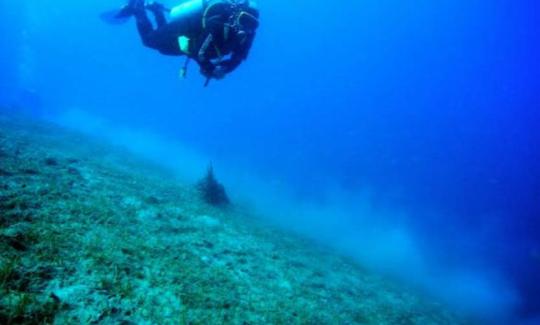
Underwater Italian archaeologists have located a first or second century AD shipwreck that was carrying 3,000 clay jars filled with Roman fish sauce made by fermentation of salted fish intestines.
Fish sauce or garum may not sound appetizing to modern people, but the ancients found it delicious and ate it at banquets. It was also sold in street food stands around the Roman Empire. It was highly nutritious and was a source of what we now call monosodium glutamate, a flavor enhancer.
The archaeologists, led by Simonluca Trigona, found the ship 200 meters (656 feet) deep after fisherman dragged up fragments of amphorae in their nets in 2012 about five miles (8 kilometers) off of Alassio on Italy’s Ligurian coast.
Archaeologists knew what the amphorae had contained because the jars were of a type used only for fish sauce. But the wreck also had some jars that they believe were manufactured around the Tiber River in Rome and that may have been meant to transport wine to the Iberian Peninsula.
The ship was 25 meters long (86 feet). "She most likely sailed out of Rome along the Tiber and sank a couple of weeks later while making the return journey, weighed down by all that fish sauce," Dr. Trigona told TheLocal.it. “It's one of just five 'deep sea' Roman vessels ever to be found in the Mediterranean and the first one to be found off the coast of Liguria.”

The archaeologists did a painstaking search for the shipwreck even though the general area it went down was known. It took two years to find it.
In recent years, scientists have had considerable success in recovering well-preserved artifacts from shipwrecks by using sophisticated technologies like remote operating vehicles, sonar mapping equipment and genetic analysis. One finding was of an ancient salad dressing (olive oil flavored with oregano) found in a 2,400-year-old shipwreck off the Greek island of Chios.
In 2012, another 2,000-year-old shipwreck, this one off the coast of Varazze, Italy, was found with sealed clay jars that scientists had hoped would contain preserved food. Police divers identified the shipwreck 50 meters (164 feet) underwater after fishermen reported finding numerous pieces of old pottery in their nets. The wreck was buried in mud, which kept it hidden for centuries but also helped preserve it and its cargo, including a number of amphorae. The amphorae still have intact caps of pine and pitch (a kind of tar), giving archaeologists hope that the contents were still preserved.
Then, in 2013, a team of Italian scientists conducted a chemical analysis of some ancient Roman medicinal pills discovered in the Relitto del Pozzino, a 2000-year-old submerged shipping vessel that sank off the coast of Tuscany.
The results of the chemical analysis, which were published in the Proceedings of the National Academy of Sciences , revealed that the pills contain a number of zinc compounds, as well as iron oxide, starch, beeswax, pine resin and other plant-derived materials. Based on their shape and composition, scientists have suggested that the tablets were used as a type of eye medicine.
The Roman shipwreck lay near the remains of the Etruscan city of Populonia, which at the time the ship foundered was a key port along sea trade routes between the west and east across the Mediterranean Sea.
The Relitto del Pozzino was excavated by the Archaeological Superintendency of Tuscany throughout the 1980s and 90s, revealing a variety of fascinating cargo including lamps originating in Asia minor, Syrian-Palestinian glass bowls, bronze jugs, ceramic vessels for carrying wine and, of particular interest, the remains of a medicine chest containing a surgery hook, a mortar, 136 wooden drug vials and several cylindrical tin vessels, one of which contained five circular medicinal tablets. The tin vessels (called pyxides) had remained completely sealed, which kept the pills dry, providing an opportunity to find out what substances they contained.
Source: Ancient Origins
#archaeology#shipwreck#ship#history#roman#diving#divers#greece#greek#pills#ancient#discovery#italian#italy
0 notes
Text
Prince Harry praises teacher ‘compassion’ – BBC News
Image caption “I can certainly pinpoint those who had an impact on my life”
Prince Harry says the best teachers should go beyond academic lessons and teach about “resilience and compassion”.
His comments accompanied the announcement of the top 10 shortlist for this year’s Global Teacher Prize.
“We will all face setbacks and challenges,” said Prince Harry, but teachers could help to prepare people for the “ups and downs” of later life.
The top 10 includes Raymond Chambers, who teaches computing in Corby.
“In addition to reading, writing and arithmetic, the very best teachers go beyond the pages of textbooks to teach young people about determination, aspiration, resilience and of course compassion,” said Prince Harry.
He commended the achievements of the finalists of the Global Teacher Prize, run by the Varkey Foundation education charity.
His brother, Prince William, and Pope Francis sent video messages to last year’s awards ceremony, where the prize was given to a Palestinian teacher, Hanan Al Hroub.
‘Turbulent times’
The prize, with an award of $1m (810,000), is intended to raise the status of teaching and to recognise the impact of teachers on individual lives.
“We will all face setbacks and challenges in our lives, and our teachers play a vital role in preparing us for these ups and downs,” said Prince Harry.
Image caption Raymond Chambers is the UK’s entry in the shortlist for the Global Teacher Prize
He said that teachers were there to help young people “often through turbulent times in their lives”.
And he said: “I can certainly pinpoint those who had an impact on my life.”
Mr Chambers, a computer science teacher from Brooke Weston Academy, Corby, Northamptonshire, is the only UK finalist in the top 10.
He is a previous winner of the UK’s annual teaching “Oscars”, in the category of outstanding use of technology.
He has won an “expert educator” award from Microsoft and runs a YouTube computer science channel, which has had 250,000 views.
He will be up against rivals from countries including China, Brazil, Kenya and Australia.
Sunny Varkey, founder of the Varkey Foundation, said he wanted the award to “shine a powerful spotlight on the incredible work teachers do all over the UK and throughout the world every day”.
The 10 finalists for the Global Teacher Prize 2017 are:
Raymond Chambers, computer science teacher from Brooke Weston Academy, Corby, Northamptonshire, UK
Salima Begum, head teacher at Elementary College for Women Gilgit, Pakistan
David Calle, from Madrid, Spain, the founder and creator of the Unicoos educational website
Wemerson da Silva Nogueira, a science teacher at the Escola Antonio dos Santos Neves in Boa Esperanca, Brazil
Marie-Christine Ghanbari Jahromi a physical education, maths and German teacher at Gesamtschule Gescher school, Germany
Tracy-Ann Hall, an automotive technology teacher at Jonathan Grant High School in Spanish Town, Jamaica
Maggie MacDonnell, a teacher at Ikusik School, Kativik School Board, Canada
Ken Silburn, a science teacher at Casula High School, south-west Sydney, Australia
Yang Boya, a psychology teacher at The Affiliated Middle School of Kunming Teachers College, China
Michael Wamaya, a dance teacher from Mathare, Nairobi, Kenya
Read more: http://ift.tt/2ll57wy
from Prince Harry praises teacher ‘compassion’ – BBC News
0 notes